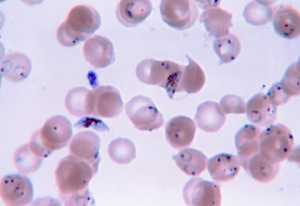Fogarty funds ecology, genetics studies of malaria in Ghana
November / December 2013 | Volume 12, Issue 6

Photo courtesy of CDC
A Fogarty-funded study in Ghana will focus on the
population genetics of Plasmodium falciparum, the
parasite that causes the most lethal form of malaria.
To improve malaria elimination methods, Fogarty has awarded $1.8 million to researchers at the University of Michigan. A four-year award from Fogarty's Ecology and Evolution of Infectious Diseases Initiative (EEID) will fund a new project, the Impact of Seasonality and Vector Control on Population Structure of P. Falciparum, in Ghana focused on the impact of vector control and seasonality on the population structure of Plasmodium falciparum, the most lethal variety of the malaria parasite and the prevalent species in sub-Saharan Africa. The study could result in a conceptual shift in practices regarding control of the disease.
The groundbreaking initiative will link two discrete fields of malaria research: the ecological dynamics of malaria and the molecular and population genetics of "var" genes. Var genes are crucial in enabling Plasmodium falciparum to evade the immune system of the host. Using both modeling and empirical studies, the research team will examine transmission dynamics of the disease in a genetic context, with the goal of achieving a more thorough molecular sampling of parasite populations in the northern region of the country. The approach used by the researchers will also factor in the effect of seasonal changes and vector control methods such as indoor residual spraying.
Bringing together mathematical modelers, epidemiologists, entomologists, bioinformatics experts, geneticists and malaria specialists from Ghana and the U.S., the project will give graduate and postdoctoral students with different specialties an opportunity to collaborate and develop cross-disciplinary ideas. The designers of the study hope that the resulting findings will lead to a more accurate understanding of malaria transmissibility and parasite diversity, bringing about innovation in surveillance and control strategies.
The Ecology and Evolution of Infectious Diseases Initiative is a joint program between the National Institutes of Health and the National Science Foundation (NSF) that funds interdisciplinary efforts to understand the ecological and biological mechanisms governing relationships between human-induced environmental changes and the spread of infectious diseases. The projects supported by the program apply ecological and biomedical methods, examining how events such as habitat alteration, biological invasion and pollution alter the emergence and transmission of viral, parasitic and bacterial diseases.
More Information
To view Adobe PDF files,
download current, free accessible plug-ins from Adobe's website.